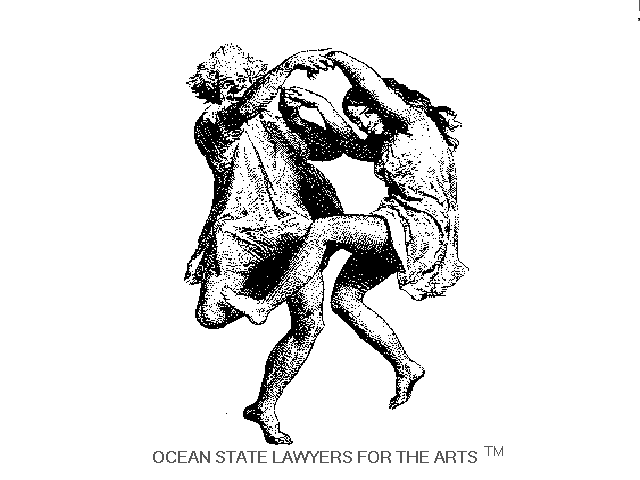
As many readers of past OSLA ARTS & LAWS newsletters and this website know, a copyright protects a tangible work that incorporates artistic elements. It does not protect an idea not put into some tangible form such as a painting, manuscript or audio/visual work, nor does it protect anything lacking artistic elements or characteristics, such as a phrase or company name standing alone.
A trademark, on the other hand, may be a word, symbol, design or combination word and design, a slogan or even a distinctive sound or style which identifies and distinguishes the goods or services of one party from those of another. Normally, a trademark for goods appears on the product or its packaging, while a service mark is usually used in advertising to identify the owner's services, i.e. OCEAN STATE LAWYERS FOR THE ARTS which is a registered service mark associated with the services of this newsletter and other services of this Rhode Island affiliate of VLA. Simply stated, trademarks, and servicemarks, are the name and logo with which the public identifies your goods and services.
Unlike a copyright or patent, trademark rights can last indefinitely if the mark continues to perform a source-indicating function. In other words, you must continue to use it properly in conjunction with your goods or services to retain the rights. In terms of registration with the U.S. Patent & Trademark office, the term of federal trademark registration is 10 years, with 10 year renewal terms. (link to regist.htm)
There are certain requirements with which you must comply for federal registration, but there are also certain rights such registration will give you. You can also register a mark in a certain state only, which gives you different rights from federal registration.
As Federal legislation states, such marks include ``any word, symbol or device .. used by a person (or other entity), or which a person has a bona fide intention to use in commerce. Your mark can be registered with the Federal Patent & Trademark Office (PTO) in order to provide you with the ability to protect your rights in the mark in Federal Court, should others use it without your permission. One kind of registration is based on your actual use of the mark in interstate commerce prior to the registration. In order for such registration to be valid, the use must be ``actual.''
A limited use such as printing up a few pieces of blank stationary, containing your logo, on your computer and sending them to a friend living in another state would probably not meet the requirements. Of course, the PTO does not check the status of your claimed ``actual'' use, and the question of validity of your registation generally arises only when another person challenges your rights in the mark.
Another way of registering your mark is by declaring your ``intent to use'' it. This method still requires the use actually take place in order to legitimize your claim of ownership. Your rights in your mark are based upon the legal premise that another mark which is the same as, or similar to, yours is likely to confuse the public as to the identity and origin of the goods or services. Of course, if you registered your mark and never actually used it, the public never got a notion of the origin of any goods or services identified by the mark. Therefore, your ownership of the mark would probably be deemed invalid if you ever had to protect it in a court of law, and other persons would be justified in using the same, or similar, mark without your permission.
First Published Version, copyright 1993 David M. Spatt
THIS WEBSITE CANNOT BE USED AS A SUBSTITUTE FOR SOUND LEGAL ADVICE FROM A COMPETENT ARTS OR ENTERTAINMENT ATTORNEY. In the event of a legal problem or question, specific legal consultation is advised. This website is intended only as a means of educating arts organizations and artists of all disciplines as to their potential legal rights and liabilities. The information provided is made available with the understanding that neither OSLA nor the office of David M. Spatt is engaging in the rendering of legal counsel.
copyright 1997 David M. Spatt, All rights reserved
Reproduction is prohibited without the express written consent of the author
